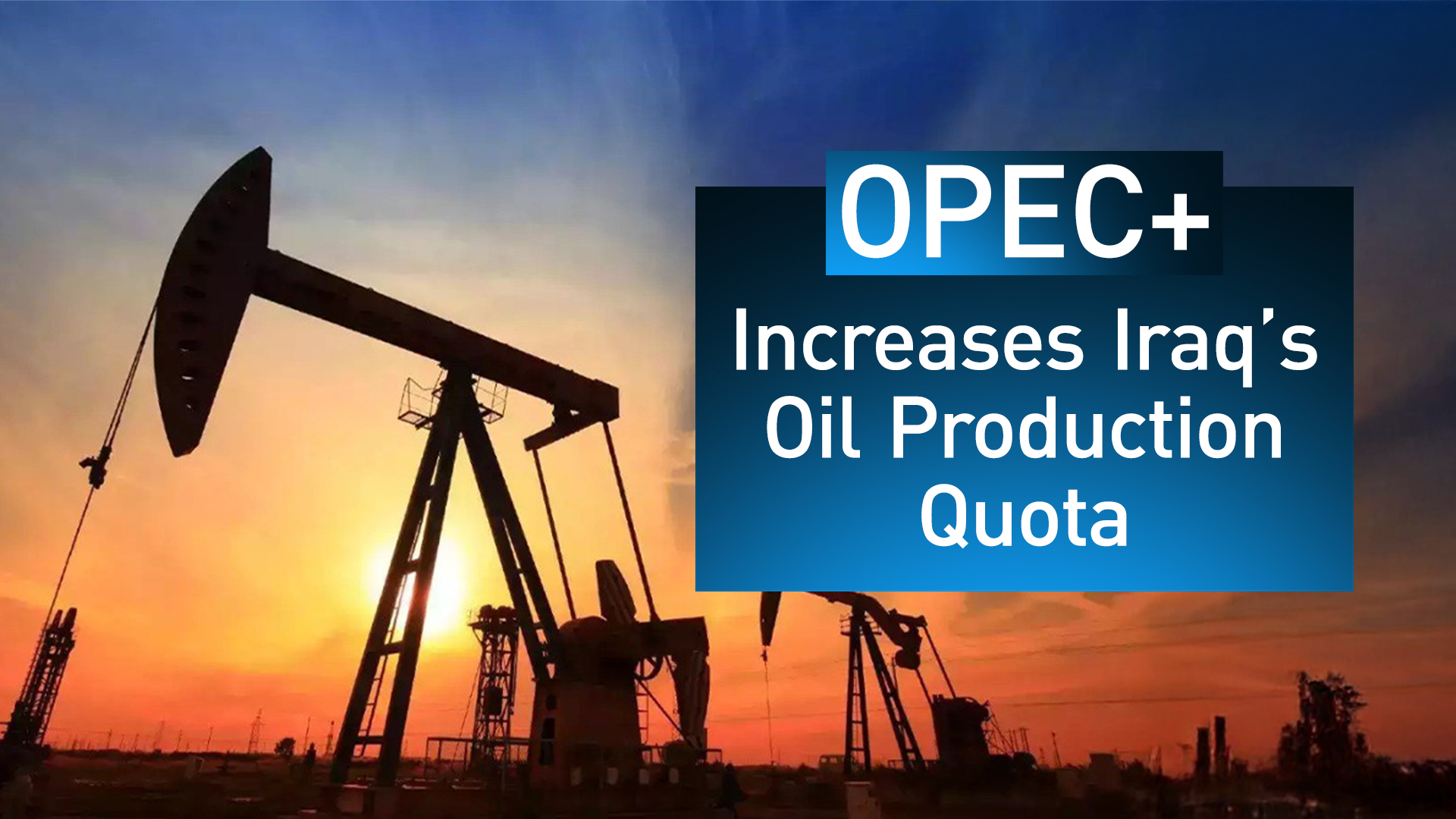OPEC Plus Increases Iraq’s Oil Production Quota
Under the new quota adjustments, Iraq’s oil production will rise gradually. Starting in April, output increases by 12,000 barrels per day each month, reaching 4.024 million bpd in May. By January 2026, production hits 4.11 million bpd, surpassing 4.22 million bpd from September to December 2026.

ERBIL (Kurdistan24) – The Organization of the Petroleum Exporting Countries and its allies, known as OPEC Plus, has approved an increase in Iraq’s oil production quota, allowing the country to gradually expand output to 4.11 million barrels per day by the end of 2025.
The decision, reached on Tuesday, comes as part of a broader strategy by the alliance to balance global oil supply amid evolving market dynamics.
The agreement follows extensive discussions among OPEC Plus member states—including Iraq, Saudi Arabia, Russia, the UAE, Kuwait, Kazakhstan, Algeria, and Oman—regarding the current state of global oil markets and future projections. The group reaffirmed its commitment to maintaining output restrictions previously agreed upon in April and November 2023, which are set to remain in place until the beginning of next month.
Under the newly approved quota adjustments, Iraq’s production is set to rise incrementally.
Beginning in April, Iraq’s output will increase by 12,000 barrels per day, followed by another 12,000-barrel rise in May, bringing total production to 4.024 million barrels per day.
This upward trend will continue into next year, with Iraq’s daily production reaching 4.11 million barrels by January 2026. Looking further ahead, Iraq’s quota from September to December 2026 will surpass 4.22 million barrels per day.
This gradual increase aligns with Iraq’s long-term production ambitions, as the country seeks to bolster its oil sector while adhering to OPEC Plus regulations designed to prevent market oversupply.
The move also reflects Iraq’s efforts to optimize its economic stability through controlled expansion in oil exports, which remain the backbone of the country’s revenue.
Market Reactions and the Iraq-Turkey Pipeline
Oil prices experienced volatility following reports of the anticipated reopening of the Iraq-Turkey pipeline, raising expectations of increased supply despite Iraq’s ongoing commitment to OPEC+ production constraints. According to Robin Mills, CEO of Qamar Energy, crude oil prices initially rose on Monday but dropped on Tuesday as news of the pipeline’s resumption emerged.
Read More: Iraq-Turkey Pipeline Reopening Pressures Oil Prices, Signals Potential Market Shift
The country’s Deputy Oil Minister, Bassem Mohammed, confirmed that once domestic allocations are met, up to 185,000 barrels per day from the Kurdistan Region could be exported through the pipeline.
Before its closure in March 2023—following an arbitration ruling—the pipeline transported around 450,000 barrels per day. Mills noted that while the reopening of the pipeline may temporarily pressure oil prices, Iraq remains bound by its OPEC+ commitments, making long-term price impacts uncertain.
He also highlighted U.S. diplomatic efforts to facilitate the pipeline’s resumption, noting that Washington has been pressuring Baghdad to restart exports through negotiations with the Kurdistan Regional Government (KRG) over budget allocations and payments to international oil companies.
OPEC Plus Strategy: Balancing Market Supply and Demand
The decision to adjust Iraq’s production comes against the backdrop of previous voluntary reductions implemented by OPEC Plus. In April 2023, the alliance announced a collective cut of 1.65 million barrels per day, a measure that was extended through the end of 2024. Later, in November 2023, OPEC Plus introduced an additional production cut of 2.2 million barrels per day, which remains in effect until the end of March this year.
These production strategies are designed to stabilize global oil prices amid fluctuating demand and economic uncertainties. As key oil-producing nations continue to assess global energy needs, the alliance remains cautious about any abrupt supply increases that could lead to price volatility.
Iraq, as OPEC’s second-largest producer after Saudi Arabia, plays a crucial role in the global oil market. The country’s energy sector is a pillar of its national economy, accounting for the majority of state revenues. While the OPEC Plus production cuts have constrained Iraq’s short-term output growth, the gradual quota increase signals a more flexible approach toward balancing economic needs with market stability.
The reopening of the Iraq-Turkey pipeline is particularly significant for the Kurdistan Region, which has faced financial strain since the shutdown. U.S. involvement in pushing for the pipeline’s resumption is part of broader geopolitical maneuvering, with Washington seeking to counter Iran’s influence in Iraq by strengthening economic ties with Erbil.
Read More: U.S. Pressures Iraq to Resume Kurdish Oil Exports Amid Sanctions on Iran
Meanwhile, British Petroleum (BP) has reinforced its presence in Iraq’s energy sector by finalizing a deal to redevelop the massive Kirkuk oil fields. Mills pointed out that BP, part of the original consortium that discovered Kirkuk’s oil in 1927, estimates the contract area contains up to 20 billion barrels of oil equivalent. This redevelopment could position Iraq to negotiate a higher production quota within OPEC+ in the future.
The new agreement is expected to have a significant impact on Iraq’s budget planning and economic policies. With a controlled expansion in production, Iraq can benefit from increased revenues while avoiding market disruptions. The deal also underscores the country’s ongoing cooperation with OPEC Plus, ensuring alignment with broader oil market strategies.
Read More: Oil Exports Nearing Revival: Key Inspections Underway
As Iraq prepares to implement these production increases, industry experts will closely monitor global market trends and the response of key consumer nations. While the gradual quota rise provides an opportunity for economic growth, Iraq will continue to navigate the challenges of maintaining a competitive yet responsible position within the global energy landscape.
The OPEC Plus agreement marks another strategic step in Iraq’s oil policy, reinforcing its role in shaping global oil production dynamics while safeguarding its economic interests in an ever-evolving market.